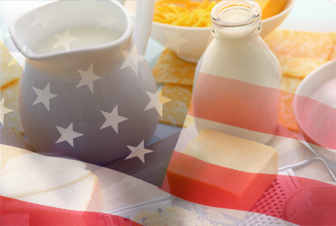
Story At-A-Glance >> The Wyoming Food Freedom Act allows the direct sale of all raw dairy products from producer to the consumers. >> Opposition forces chiseled support in the MT Senate and persuaded the WV Governor to veto a herdshare bill. |
This year has been a productive session for legislation increasing access to raw milk. While there is still resistance to raw milk legislation, opposition has declined overall around the country. With deaths being attributed to the consumption of cheese and ice cream made with pasteurized milk, raw milk opponents’ arguments about food safety aren’t getting the traction they once had.
Five states passed laws positively impacting the ability of consumers to obtain raw milk and raw milk products; they are as follows:
OREGON – HB 2446
On May 12, Governor Kate Brown signed legislation that lifted an advertising ban on raw milk sales. House Bill 2446 (HB 2446) stemmed from a 2014 settlement between dairy farmer Christine Anderson and the Oregon Department of Agriculture (ODA) over a lawsuit challenging the state law prohibiting advertising. Under the terms of the settlement, ODA agreed not to enforce the ban contingent on the legislature passing a bill during the 2015 session that repealed the advertising prohibition. If no bill had passed, the agency would have immediately resumed enforcement. The Anderson settlement and new law should serve as a deterrent against other states enacting or enforcing similar bans.
SOUTH DAKOTA – SB 45
Prior law allowed the sale of raw milk on the farm and at farmers markets; Senate Bill 45 (SB 45), which was signed into law in March, expands sales of raw dairy to include cream but now limits where producers can sell raw milk to on the farm and through delivery (including farmers markets). The new law benefits producers by creating a new category: raw milk for human consumption. The South Dakota Department of Agriculture (SDDA) is assigned to issue governing regulations for this category. Prior to SB 45’s passage, raw milk producers were subject to regulations that were originally written for Grade A dairies and manufactured milk producers. Raw milk supporters have pointed out that raw milk produced for direct consumption and raw milk produced for pasteurization are two different products. SB 45 acknowledges that there is a difference. Rules SDDA has proposed for the new category does not have, among other things, some of the more onerous physical facility requirements that Grade A dairies and milk manufacturing plants must comply with.
An interesting aspect of the proposed regulation is that while they require testing for coliform bacteria, which all raw milk licenses throughout the country test for, South Dakota does not set any standards for coliform levels. SDDA will monitor producer’s coliform levels but they won’t take punitive action against producers for their coliform counts. In Pennsylvania, producers have been fined for coliform counts above the legal limit. The South Dakota proposal is more in line with the thinking of those that believe coliform testing is not a good indicator of milk safety. The proposed regulations are scheduled to go into effect July 1, 2015. A workgroup consisting of raw milk producers, consumers, and SDDA officials, among others, worked on the drafting of both the bill and proposed regulations.
UTAH – HB 104
In March, Governor Gary Herbert signed House Bill 104 (HB 104) into law. HB 104 partially lifts the state’s herdshare ban by allowing the distribution of raw milk through “cow-share programs if there are no more than 2 cows, 10 goats and 10 sheep per farm.” Utah banned herdshares through legislation passed in 2007. The licensed on-farm sale of raw milk has long been legal in the state but the number of licensed dairies has dropped substantially the past 20 years, a factor that increased the chances of passage for HB 104.
In spite of the bill only applying to micro-dairies, HB 104 drew significant opposition from the Utah dairy industry and Farm Bureau with the latter opposing the legislation right until the end. Four individuals did the bulk of the work on the bill from start to finish; farmer Symbria Patterson, her daughter Sarah, farmer Paula Millby and Conner Boyack, president of the Libertas Institute. The Pattersons were a study in perseverance; commuting 200 miles twice a week from their farm to Salt Lake City to lobby. For the last two weeks of the legislative session, the Pattersons did not leave the capital; tragically, Symbria’s husband, Lynn, who had been maintaining their farm and CSA, passed away on the evening the bill was signed.
VERMONT – HB 484
On May 28, Governor Peter Shumlin signed House Bill 484 (HB 484) into law. The bill is a measure that changed a number of Vermont’s agricultural laws including provisions amending the state’s raw milk statutes. Under the existing two-tier system, producers now can sell more raw milk each week (i.e., increased from 280 up to 350 gallons) if they comply with additional requirements on matters such as inspection, registration and testing. Another significant change in the law is that all raw milk producers will no longer have to test their cows annually for tuberculosis and brucellosis; under HB 484 only a one-time negative test or proof of a recent one-time negative test is required.
The tier 2 producers had been required to warn their customers if even one test result showed the total bacteria or coliform count was over the legal limit; if follow-up tests were above the limit, producers were required to stop all sales until they got a test result that was in compliance. Producers with one high somatic cell count test had to not only warn their customers, but also contact a veterinarian to assess the herd and milking procedures. HB 484 does away with the consumer warning; now the Secretary of the Vermont Department of Agriculture, Food and Markets issues a warning if two out of four consecutive monthly tests exceed the limit and has the authority to suspend the producers’ sales when three out of five tests do so.
Since Vermont has a two-year legislative session, a separate bill aiming to expand raw milk sales to retail stores and legalize the sale of other raw dairy products will still be under consideration next year.
WYOMING – HB 56
Governor Matt Mead signed the Wyoming Food Freedom Act (HB 56) into law on March 3. The new law gives farms, ranches and home kitchens the right to sell any foods, other than meat products, they produce direct to the consumer without any government regulation or inspection. Sales can take place at farms, ranches, private homes, farmers markets and through delivery.
The Food Freedom Act legalizes the sale of any raw dairy product including unaged cheese. The sale of raw cheese that has not been aged at least 60 days is prohibited in interstate commerce but states do have the option of not having any aging requirement in their laws. At this time, Wyoming has the most favorable laws on the sale of raw dairy products in the U.S. A factor in the bill’s passage was the lack of a dairy industry in Wyoming to provide opposition. According to the state, there are only 30 Grade A dairies left in the state; other estimates have the number as low as ten.
OTHER STATES
There are still ten states that do not allow any sale or distribution of raw milk by statute, regulation or policy. Two of them, Montana and West Virginia, came close to changing their laws in 2015.
MONTANA – HB 245
In Montana, House Bill 245 (HB 245) passed the State House of Representatives by a big margin but was defeated in the Senate by one vote. HB 245 would have legalized the on-farm sale of raw milk and raw milk products. The bill included requirements for testing, labeling and signage. HB 245 also would have exempted herdshare operations from any of the requirements in the bill for those selling raw dairy. The Association of Montana Public Health Officials had their lobbyist work against the bill on the taxpayers’ dime. That combined with opposition from agribusiness interests was enough to prevent the bill from getting to the governor’s desk.
WEST VIRGINIA – SB 30
On April 2, West Virginia Governor Earl Ray Tomblin vetoed Senate Bill 30 (SB 30), a measure that would have legalized herdshare agreements in the state. Current state law bans herdshares, sales of raw milk for human consumption and sales of raw milk for pet consumption. SB 30 had passed the West Virginia House of Delegates by an 81-19 margin. The National Milk Producer Federation and the International Dairy Foods Association sent Tomblin a joint letter urging him to veto the bill. The veto means that dairy farmers in the state will continue to lose the business of West Virginia consumers to Pennsylvania raw milk producers.
As the demand for raw milk continues to grow across the country, state legislatures need to acknowledge this by supporting freedom of choice and increased access to raw milk. The 2015 legislative session was a step in the right direction.
Read FTCLDF’s last post on the subject, State Raw Milk Bills – 2015 Update
YOUR FUND AT WORK
 Services provided by the Farm-to-Consumer Legal Defense Fund (FTCLDF) go beyond providing legal representation for members in court cases.
Services provided by the Farm-to-Consumer Legal Defense Fund (FTCLDF) go beyond providing legal representation for members in court cases.
Educational and Political Action Services also provide an avenue for FTCLDF to build grassroots activism to create the most favorable regulatory climate possible. In addition to advising on bill language, FTCLDF supports favorable legislation via action alerts, social media outreach, and the online petition service.
You can help FTCLDF by becoming a member or donating today.

 Anyone wanting to make a contribution to support the work of FTCLDF can make a donation online or send a check to:
Anyone wanting to make a contribution to support the work of FTCLDF can make a donation online or send a check to:
FTCLDF
8116 Arlington Blvd, # 263
Falls Church, VA 22042
Prefer to make a tax-deductible donation? Contact us by email at [email protected] or call 703-208-FARM (3276). Thanks for your support.